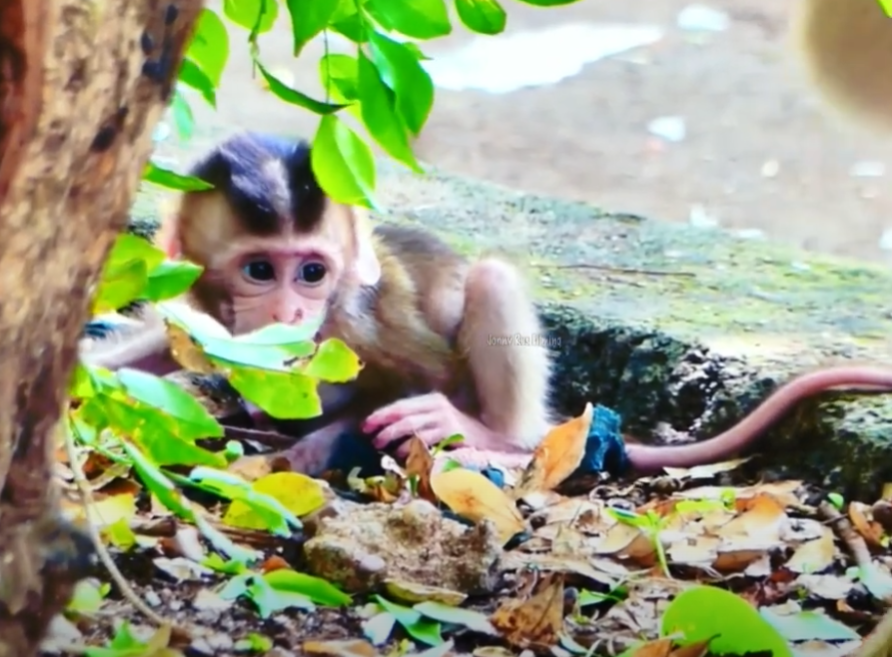The Angkor Wat forest stirred gently with the rising sun. Golden light shimmered through the canopy, but beneath the leaves, a very different scene was unfolding—one that silenced even the chattering birds for a moment.
A young mother monkey named Rina was sitting quietly on a sun-dappled stone, her body hunched, her eyes tired. Nestled against her was her tiny infant—barely two weeks old. He whimpered softly, then began to cry—a sharp, gasping cry that pierced the morning calm.


Little Mavi was hungry again. His trembling hands reached for his mother’s chest, instinctively searching for comfort, warmth, and most of all—milk. But Rina did not move. She looked down at her child with a kind of pained helplessness in her eyes. She had nothing left to give.
Observers in the forest, including a few regular wildlife photographers and locals who knew the troop well, watched with heavy hearts. Rina had been through a difficult week. Her body was thin, her fur patchy from stress. And yet, she had been nursing Mavi constantly. So much so, in fact, that her milk had stopped flowing days earlier.
The problem wasn’t neglect—it was exhaustion.
Mavi had become increasingly demanding, as many infants do when they’re scared, cold, or overly attached. His appetite was insatiable, and with no other food sources and little rest, Rina’s body had simply given up producing. Every time Mavi latched, he got nothing… and cried harder.
This morning, Rina made the heartbreaking decision: she pulled away.
With slow, deliberate movement, she gently unhooked Mavi from her chest. He let out a sharp cry and clung harder. Rina turned her body, shielding herself—but Mavi wailed louder. His tiny fists pounded her soft belly in frustration. His voice cracked as he begged in the only way a baby monkey could.
And then came the moment that shattered everyone’s hearts.
Rina stood up, holding her crying infant in one arm, and walked to a quiet corner near the roots of a large fig tree. She sat him down softly. He scrambled back to her, terrified. She pulled away again, her eyes brimming with emotion. Her face was torn between guilt and instinct. She reached out and touched his head, pulling him briefly into a hug—but she would not let him nurse.
Rina was not rejecting her baby—she was teaching him resilience. She had to force him to stop trying so he wouldn’t waste his energy on a dry well.
Nearby, an older female—perhaps Rina’s sister—approached and offered a brief distraction, grooming Rina to help calm her. Mavi sobbed into the dirt for a moment, then looked around. His cries softened into whimpers. And then… he began to explore, stumbling toward a cluster of leaves.
For the first time in days, he wasn’t nursing.
In that moment, a difficult transition had begun—one that all mothers, animal or human, must sometimes face. The moment they must stop giving endlessly and start letting go, just enough for their child to stand.
That morning in Angkor Wat, under the shelter of the forest, Rina taught Mavi his first hard lesson: sometimes love means saying “no.” Not out of cruelty, but out of strength. And even as his little heart broke from hunger and confusion, he was learning that life, like the forest, is both kind and cruel.
And he was not alone. Rina was nearby, always watching.
By sunset, they were curled together again—Mavi quieter now, his tiny body warm against hers. He hadn’t had milk. But he had his mother’s arms. And somehow, that was enough.